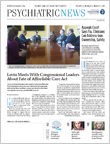A study that tracked the long-term mental health outcomes of women who obtained or were denied abortions has concluded that abortion does not increase a woman’s risk of mental health problems five years later. In fact, as was reported in the February JAMA Psychiatry, women who had obtained an abortion demonstrated more positive outcomes initially compared with women who were denied an abortion.
“There is a considerable amount of misinformation about negative mental health consequences as a result of abortion,” said former APA President Nada Stotland, M.D., who was not involved with the study. Stotland is an expert in reproductive psychiatry. “It’s important that we, as mental health professionals, have and provide evidence-based information to patients so that they may make their own decisions … without being influenced by inaccurate information,” she told Psychiatric News.
The study, which was led by M. Antonia Biggs, Ph.D., a social psychologist researcher at the University of California, San Francisco, was inspired by the 1989 call by the U.S. Surgeon General for more studies to examine the long-term health effects of abortion on women.
“Currently we have legislation in several states mandating that women accessing abortion services be counseled on the negative psychological effects of abortion,” Biggs told Psychiatric News. “These policies may result in denying women care, and the policies do not consider what happens to women when they are turned away from abortion care.”
For the study, Biggs and colleagues recruited women aged 15 and older from 30 abortion clinics in 21 states throughout the United States. A total of 956 women was interviewed one week after seeking an abortion, and then every six months for five years. The researchers compared the mental health trajectories of women who received an abortion with those who were denied an abortion (due to the pregnancy being beyond the gestational limits of the facility). The group of women turned away from abortion was further divided into those who gave birth and those who miscarried or later had an abortion elsewhere.
The researchers found that women who were denied an abortion, particularly those who later miscarried or had an abortion elsewhere, had the most elevated levels of anxiety and lowest self-esteem and life satisfaction one week after being denied an abortion. These differences quickly improved, and by months 6 and 12 levels of anxiety, self-esteem, and life satisfaction were similar among all groups.
“Our findings add to the body of evidence rejecting the notion that abortion increases women’s risk of experiencing adverse psychological outcomes,” Biggs and colleagues wrote. “Thus, there is no evidence to justify laws that require women seeking abortion to be forewarned about negative psychological responses.”
Biggs told Psychiatric News that health care professionals should understand that psychological outcomes of women who have had or been denied an abortion will vary from woman to woman and should be dealt with accordingly.
“More than half of the patients in psychiatry are women, and according to statistics, at least 30 percent of these patients will have had or contemplated an abortion in their lifetime,” said Stotland. “It’s time for mental health professionals and for our professional organizations to be more active advocates on this important issue,” Stotland said.
The study was funded by the Wallace Alexander Gerbode Foundation, the David and Lucille Packard Foundation, and the William and Flora Hewlett Foundation. ■
An abstract of “Women’s Mental Health and Well-Being 5 Years After Receiving or Being Denied an Abortion” can be accessed
here.
